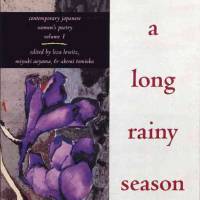In 1901, poet Akiko Yosano's "Midaregami" ("Tangled Hair") was published. This collection of 399 sensual, explicit tanka and haiku poems broke with the formal traditions set down centuries before. Her book allowed Japanese verse to transition from feminine to feminist.
A Long Rainy Season: Haiku & Tanka, Edited by Leza Lowitz, Miyuki Aoyama, Akemi Tomioka, Illustrated by Robert Kushner.
198 pages
Stone Bridge Press, Poetry.
Yosano's seditious mention of "breasts" scandalized elements of Meiji Era (1868-1912) society, but even Yosano might have been shocked by some of the content of "A Long Rainy Season." Published in 1994, this collection of translated poems by 15 Japanese women includes a candid description of menstruation by Amari Hayashi.
Abandoning orthodox poetry, these writers represent a range of perspectives, including the fragile, existential moods of Machi Tawara's verse and the tongue-in-cheek beseeching of Ei Akitsu: "Crepe myrtle! / Isn't there a man / who will give himself / up to me / to be ruined?"
The verses of Motoko Michiura, reeking of politics and tear gas, are scoured with allusions to nature — a private rebellion in aesthetics allowing her to write, "Okinawan girl / tearing down the / flag of the Rising Sun / I want to hold her / in my arms."
The genius of these poems is in their profound brevity, but also the jolt of life they impart to readers tranquilized by milder verse.
Read archived reviews of Japanese classics at jtimes.jp/essential.

















With your current subscription plan you can comment on stories. However, before writing your first comment, please create a display name in the Profile section of your subscriber account page.